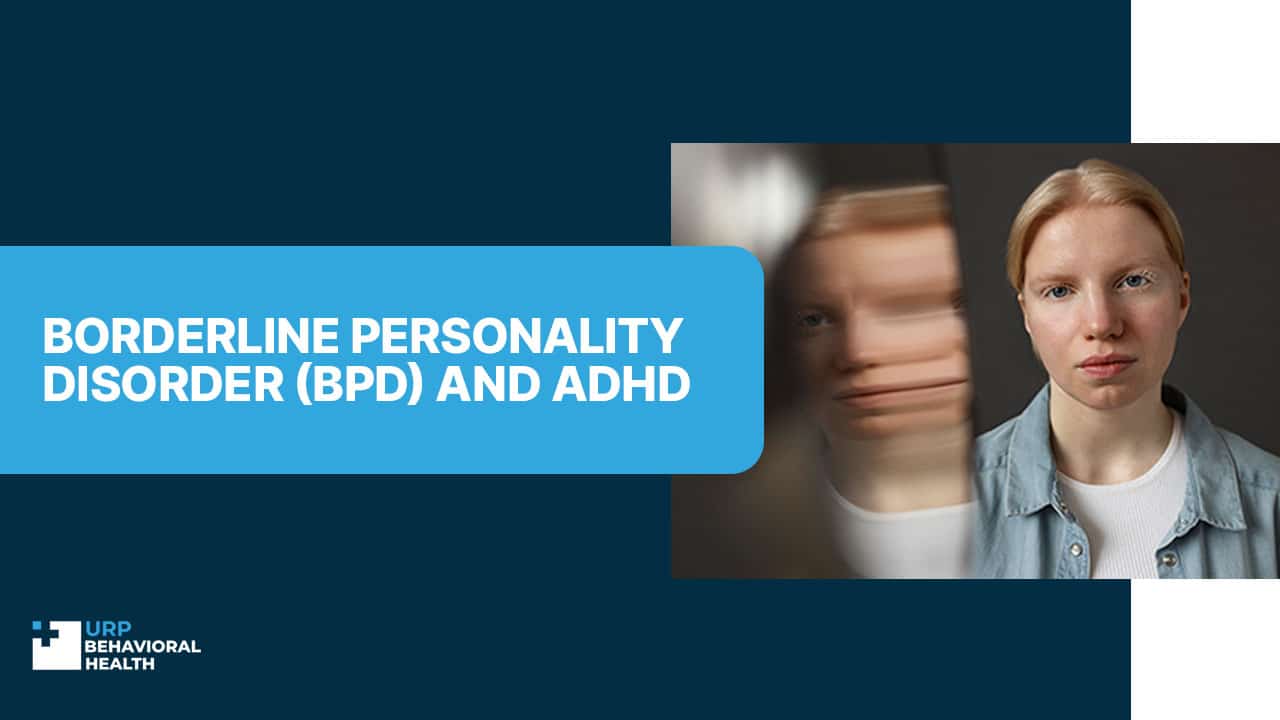
Borderline Personality Disorder (BPD) and ADHD
More and more people now pay attention to their mental health, and asking for professional help is becoming mainstream. There’s still a lot to do, of course. But those who suffer from different disorders are more likely to face compassion than judging. It’s vitally important because the correct and timely diagnosis contributes to the proper treatment and subsequent comeback to a productive life.
All those things are so true about attention deficit hyperactivity disorder (ADHD) and borderline personality disorder (BPD). Only in the USA, there are 13% of men and 4.2% of women [1] diagnosed with ADHD vs borderline personality disorder, which affects 1,6% of the whole population or over four million people [2].
The Link Between ADHD and BPD
BPD and ADHD have many overlapping symptoms, which confuse patients and even specialists. Understanding the difference between these two conditions is essential to ensure adequate treatment. Let’s look at every disorder one by one, starting with borderline personality disorder.
What Is BPD?
With no one definitive root cause, most commonly, BPD forms in childhood/adolescence amid repeated traumatic causes like long-term violence, bullying, or parent loss. Nevertheless, not everyone with such experiences gets BPD. A combination of genetic predispositions plays a significant role here. The studies show that almost half of BPD cases arose from genetic factors. [3]
We’ll help you understand your options and guide you toward care.
What Is ADHD?
As with BPD, ADHD has genetic, physiological, and external causes. ADHD also develops in childhood. It influences brain parts involved in attention, self-control, and discipline. Environmental reasons for ADHD are not a trauma, as is the case of BPD, but a combination of various factors. Nevertheless, the clear picture of this disorder’s origin is unknown.
Symptoms of Borderline Personality Disorder
On the physiological level, disorder progression increases the amount of cortisol, forcing a person to live in a state of intense anxiety. Because of it and repeated traumatic events, the amygdala, part of the brain responsible for our emotions, becomes overactive. [4] Conversely, the prefrontal cortex, which is in charge of cognitive functions, is suppressed, and decision-making suffers. [5]
Emotional volatility and constant anxiety are not the easiest to manage. So, some people with BPD choose to cope with it with impulsive behavior like using drugs and alcohol, engaging in uncontrolled sexual activity, dangerous driving, etc. These practices are self-destructive but promise quick relief, even when it’s self-harm or suicide attempts. It makes self-perception problems even worse. Such patients have a shaky self-image as if they don’t know who they are and what they want from life. [6]
Symptoms of Attention Deficit Hyperactivity Disorder
The manifestations of ADHD are inattentiveness and impulsivity. Such patients may suffer from both or have only focused or acted without thinking issues. Anyway, it creates a lot of problems in real life. With concentration problems, these people fall behind in school and, later, colleagues. It has a subsequent negative impact on their career perspectives.
Hyperactivity manifestations make people with ADHD constantly motion and excessively talk. They tend to lack a sense of danger, putting them in a life-threatening situation. It’s hard for ADHD patients to build close and long-lasting relationships as well. All this leads to low self-esteem. [7]
Overlapping Symptoms
Let’s look at BPD vs ADHD symptoms. They can be similar to each other and other disorders like depression and schizophrenia. It may lead to misdiagnosis and subsequent wrong treatment. So, instead of recovering, a person gets worse and becomes skeptical of medicine. Among overlapping symptoms are:
- impulsivity;
- emotional volatility;
- difficulty maintaining ties;
- low self-esteem and self-image Issues;
- difficulty with focus and attention;
- dysfunctional coping strategies
- feelings of despair, shame, guilt, and anxiety accompanying the disorder struggle. [8]
What’s the Difference Between BPD and ADHD?
Despite many similarities, these conditions have some distinguishing aspects. For instance, impulsivity is connected to hyperactivity of a person with ADHD vs borderline personality disorder, where it’s caused by psychological volatility. Also, similar symptoms may be milder or more severe, depending on the condition. Emotional dysregulation is manifested weaker in ADHD, while in BPD, it’s one of the main devastating symptoms.
Such nuances may seem insignificant but could strongly influence the treatment plan. With such a thin line between the two conditions, self-diagnosis is not a good idea. If you suffer from any of the symptoms described, please seek medical advice. Doctors would help you find the difference between ADHD and borderline personality disorder. [9]
Can you have ADHD and BPD?
Unfortunately, yes, BPD and ADHD together can meet in one person. But the good news here is that it’s treatable. First, it’s necessary to ensure that there are truly two sets of symptoms for both disorders. Mental health is the spectrum, and everyone’s psyche is unique. It’s possible to suffer from a mixed combination of emotional and physiological conditions typical for various disorders while being diagnosed with one only.
If it’s really a combination of ADHD and borderline personality disorder, it leads to unique treatment planning. Such a plan would be tailored to the patient’s needs, considering the symptoms of both mental illnesses. So, you can have ADHD and borderline personality disorder. But good specialists would help you with it.
Contact our admissions team now to begin your path toward a brighter future.
Treatment options for BPD and ADHD
Treatment is only prescribed after a specialist diagnoses it. It involves pharmacological treatment, psychotherapy, daily routine adjustment, and long-term monitoring.
- Drug therapy:
For BPD, it’ll be mood stabilizers or antidepressants to help with intense emotional reactions.
For ADHD, it’s about prescribed stimulators like methylphenidate and amphetamine and non-stimulators, such as atomoxetine.
- Psychotherapy:
Pharmacological treatment should be complemented by psychotherapist work. Especially helpful for both ADHD and BPD could be different kinds of behavioral therapy.
- Daily routine adjustment:
It’s crucial to amend lifestyle after diagnosis and for successful treatment. For instance, building a structured daily routine helps a lot. It reduces stress, adds predictability to life for BPD patients, and helps ADHD patients with focus. Mindfulness techniques, physical activities, diet, and support from friends and relatives will also be beneficial.
- Long-term monitoring:
Such complex treatment should be maintained with monitoring and necessary adjustments during life for lasting positive impact. [10]
Millions of people suffer from ADHD, BPD, or both of these disorders at the same time. Without proper treatment, they can ruin a patient’s life or even lead to suicidal attempts. Instead of suffering from unmanaged effects of these conditions, we recommend seeking help from specialists. And with so many similar symptoms, only a qualified mental health expert can differentiate between ADHD and BPD conclusively.
The URP Behavioral Health ensures comprehensive treatment and care for people with mental disorders. Don’t hesitate to contact us to get all the necessary support.
Reach out today and let us create a treatment plan designed around your needs.
References:
- Holland K. ADHD by the Numbers: Facts, Statistics, and You. Link: https://www.healthline.com/health/adhd/facts-statistics-infographic#fast-facts. Access date: Jul. 23, 2018
- Kristalyn Salters-Pedneault, PhD. Borderline Personality Disorder Statistics. Link: https://www.verywellmind.com/borderline-personality-disorder-statistics-425481. Access date: Nov. 25, 2020
- Muhammad Zia ul Haq. Genetic Influences on Outcomes of Psychotherapy in Borderline Personality Disorder: A Narrative Review of Implications for Personalized Treatment. Link: https://www.ncbi.nlm.nih.gov/pmc/articles/PMC10505449/#:~:text=A%20large%2Dscale%20study%20confirmed,to%20genetic%20factors%20%5B13%5D. Access date: Aug. 18, 2023
- Causes – Borderline personality disorder. Link: https://www.nhs.uk/mental-health/conditions/borderline-personality-disorder/causes/#:~:text=The%20scans%20revealed%20that%20in,as%20fear%2C%20aggression%20and%20anxiety. Access date: Nov. 4 2022
- Eric Lis, Brian Greenfield, Melissa Henry, Jean Marc Guilé, and Geoffrey Dougherty. Neuroimaging and genetics of borderline personality disorder: a review. Link: https://www.ncbi.nlm.nih.gov/pmc/articles/PMC1863557/ Access date: May 2007.
- Borderline Personality Disorder. Link: https://www.nimh.nih.gov/health/topics/borderline-personality-disorder#:~:text=People%20with%20borderline%20personality%20disorder,unstable%20relationships%20and%20emotional%20pain. Access date: 2024 April
- Adult attention-deficit/hyperactivity disorder (ADHD). Link: https://www.mayoclinic.org/diseases-conditions/adult-adhd/symptoms-causes/syc-20350878. Access date: Jan. 25, 2023
- Ellen Littman, Ph.D. When Women Battle ADHD and Borderline Personality Disorder. Link: https://www.additudemag.com/adhd-and-bpd-women-borderline-personality-disorder/#:~:text=It%20seems%20that%20a%20history,greater%20impulsivity%20and%20emotional%20dysregulation. Access date: April 8, 2024
- Ashley Olivine, Ph.D. Borderline Personality Disorder and Attention Deficit Hyperactivity Disorder. Link: https://www.verywellhealth.com/bpd-and-adhd-5209597#:~:text=The%20symptoms%20that%20overlap%20between,with%20interpersonal%20interactions%20and%20relationships. Access date: June 13, 2022
- Management Strategies for Borderline Personality Disorder and Bipolar Disorder Comorbidities in Adults with ADHD: A Narrative Review. Link: https://www.ncbi.nlm.nih.gov/pmc/articles/PMC10669289/. Access date: Nov 2023
















